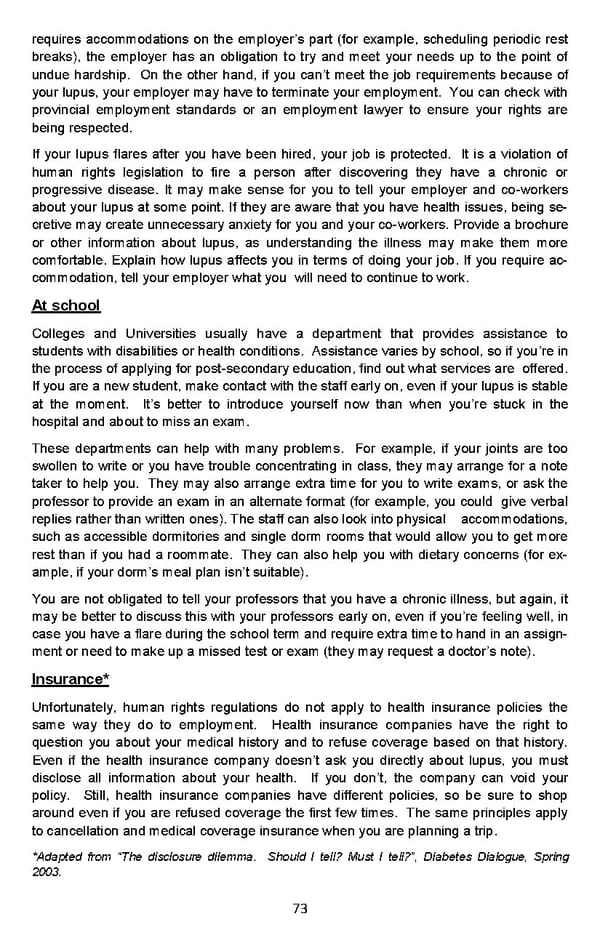requires accommodations on the employer’s part (for example, scheduling periodic rest breaks), the employer has an obligation to try and meet your needs up to the point of undue hardship. On the other hand, if you can’t meet the job requirements because of your lupus, your employer may have to terminate your employment. You can check with provincial employment standards or an employment lawyer to ensure your rights are being respected. If your lupus flares after you have been hired, your job is protected. It is a violation of human rights legislation to fire a person after discovering they have a chronic or progressive disease. It may make sense for you to tell your employer and co-workers about your lupus at some point. If they are aware that you have health issues, being se- cretive may create unnecessary anxiety for you and your co-workers. Provide a brochure or other information about lupus, as understanding the illness may make them more comfortable. Explain how lupus affects you in terms of doing your job. If you require ac- commodation, tell your employer what you will need to continue to work. At school Colleges and Universities usually have a department that provides assistance to students with disabilities or health conditions. Assistance varies by school, so if you’re in the process of applying for post-secondary education, find out what services are offered. If you are a new student, make contact with the staff early on, even if your lupus is stable at the moment. It’s better to introduce yourself now than when you’re stuck in the hospital and about to miss an exam. These departments can help with many problems. For example, if your joints are too swollen to write or you have trouble concentrating in class, they may arrange for a note taker to help you. They may also arrange extra time for you to write exams, or ask the professor to provide an exam in an alternate format (for example, you could give verbal replies rather than written ones). The staff can also look into physical accommodations, such as accessible dormitories and single dorm rooms that would allow you to get more rest than if you had a roommate. They can also help you with dietary concerns (for ex- ample, if your dorm’s meal plan isn’t suitable). You are not obligated to tell your professors that you have a chronic illness, but again, it may be better to discuss this with your professors early on, even if you’re feeling well, in case you have a flare during the school term and require extra time to hand in an assign- ment or need to make up a missed test or exam (they may request a doctor’s note). Insurance* Unfortunately, human rights regulations do not apply to health insurance policies the same way they do to employment. Health insurance companies have the right to question you about your medical history and to refuse coverage based on that history. Even if the health insurance company doesn’t ask you directly about lupus, you must disclose all information about your health. If you don’t, the company can void your policy. Still, health insurance companies have different policies, so be sure to shop around even if you are refused coverage the first few times. The same principles apply to cancellation and medical coverage insurance when you are planning a trip. *Adapted from “The disclosure dilemma. Should I tell? Must I tell?”, Diabetes Dialogue, Spring 2003. 73
 Living Well With Lupus Facts Booklet Page 72 Page 74
Living Well With Lupus Facts Booklet Page 72 Page 74